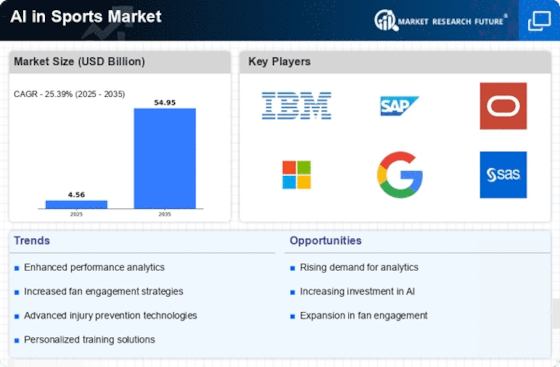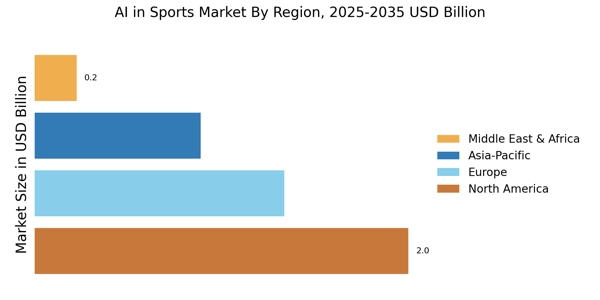Enhanced Fan Experience
The AI in Sports Market is witnessing a transformation in fan engagement through personalized experiences. AI technologies enable sports organizations to analyze fan behavior and preferences, allowing for tailored content delivery and interactive experiences. For instance, AI-driven chatbots and virtual assistants are being deployed to enhance customer service and provide real-time information. This trend is reflected in the increasing investment in AI solutions, with the fan engagement segment projected to grow significantly. As organizations strive to create memorable experiences, the integration of AI into fan interactions is likely to become a cornerstone of marketing strategies.
Data-Driven Decision Making
The AI in Sports Market is increasingly influenced by the need for data-driven decision making. Sports organizations are leveraging advanced analytics to enhance performance, optimize strategies, and improve overall outcomes. The integration of AI technologies allows teams to analyze vast amounts of data, including player statistics, game footage, and opponent strategies. This trend is evidenced by a projected growth rate of approximately 30% in the sports analytics sector, indicating a robust demand for AI solutions. As teams seek competitive advantages, the reliance on data analytics is expected to intensify, driving further investment in AI technologies.
Injury Prevention Technologies
The AI in Sports Market is significantly impacted by advancements in injury prevention technologies. AI algorithms are being utilized to analyze player biomechanics and predict potential injuries, thereby enhancing athlete safety. This proactive approach not only protects players but also reduces costs associated with injuries. The market for injury prevention solutions is expected to grow, with estimates suggesting a compound annual growth rate of around 25%. As teams prioritize player health and longevity, the adoption of AI-driven injury prevention tools is likely to become a standard practice in sports organizations.
Scouting and Recruitment Optimization
The AI in Sports Market is revolutionizing scouting and recruitment processes through advanced analytics. AI technologies enable teams to evaluate player potential more effectively by analyzing performance metrics and historical data. This data-driven approach allows organizations to identify talent that may have been overlooked through traditional scouting methods. The recruitment segment is projected to experience substantial growth, as teams increasingly rely on AI to make informed decisions. By optimizing recruitment strategies, sports organizations can enhance their competitive edge and build stronger teams.
Operational Efficiency and Cost Reduction
The AI in Sports Market is also characterized by a focus on operational efficiency and cost reduction. AI technologies streamline various processes, from ticket sales to inventory management, allowing organizations to operate more effectively. By automating routine tasks and enhancing resource allocation, teams can reduce operational costs while improving service delivery. The market for AI-driven operational solutions is anticipated to expand, as organizations seek to maximize profitability. This trend underscores the potential of AI to transform not only performance on the field but also the business aspects of sports organizations.

















